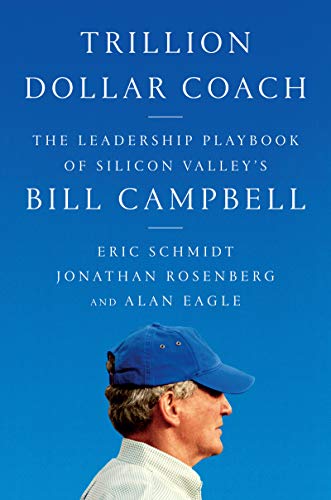In 1979, after six straight losing seasons as the head football coach at Columbia University, Bill Campbell resigned. During his tenure the team won 12 games and lost 41. He didn’t blame the failure on his players, rather he put it squarely on himself. To succeed as a football coach, he believed, one needed a quality he called “dispassionate toughness,” and he didn’t have it. By his own admission, he had too much damn compassion for his players. “I tried to make sure the kids understood what we were doing, I just think I wasn’t hard edged enough.” He was 39 years old.

Bill walked away from the football world and he took his coaching skills and applied them to the business world. As luck would have it, in business, his coaching skills were in high demand, and Bill was a natural. In fact, if you talk to the executives who were fortunate enough to work with Bill at Apple, Claris, Go, Intuit or Google, they say he was the best of all-time. Bill’s compassion for his players became his compassion for the many people and teams he coached throughout his career. What was a weakness as a football coach became a strength as a business coach.
Bills’ coaching skills were so good and so legendary, that people in Silicon Valley sought him out. And not just middle managers, we’re talking about famous executives – people whom you might think are beyond coaching and wouldn’t need his help. People like Steve Jobs. CEOs like Eric Schmidt of Google, Dick Costolo of Twitter and Scott Cook of Intuit, just to name a few. So much market value was created as a result of Bill’s coaching that he earned the nickname, The Trillion Dollar coach. Eric Schmidt and Jonathon Rosenberg of Google wrote a book about him called: Trillion Dollar Coach: The Leadership Playbook of Silicon Valley’s Bill Campbell.
So how did he do it? Here are five tips I pulled from his playbook, but I encourage everyone who wants to improve and grow as a leader to read it for yourself:
1. “Your title makes you a manager, your people make you a leader.”
This was a saying Bill was quick to share with managers who tried to lead by fear and dictatorial tactics. Bill preached the opposite approach:
“How do you bring people around and help the flourish in your environment? It’s not by being a dictator. It’s not by telling them what the hell to do. It’s making sure that they feel valued by being in the room with you. Listen. Pay attention. This is what great managers to.”
Bill liked to say, “If you’re a great manager, your people will make you a leader. They acclaim that, not you.”
2. “It’s the people.”
When Bill was leading a team, his focus was on his people. He would lie awake at night thinking about how he was going to make his people better. He worked tirelessly to create environments where people thrive. Bill liked to say, “the top priority of any manager is the well-being and success of her people.” When coaching executives on how to create an environment where people thrive, Bill would pull out his “it’s the people” manifesto and practically deliver it verbatim:
“People are the foundation of any company’s success. The primary job of each manager is to help people be more effective in their job and to grow and develop. We have great people who want to do well, are capable of doing great things, and come to work fired up to do them. Great people flourish in an environment that liberates and amplifies that energy. Managers create this environment through support, respect and trust.”
4. Run meetings well.
When Bill coached CEOs at some of the biggest tech firms in Silicon Valley, one of the areas he would focus on was running meetings. Its sounds pedestrian, but Bill was all about getting results from his teams. He was very good at bringing people together and creating a cohesive team, but he never lost sight of the goal: results. And Bill’s teams delivered. Results come from good management, and good management requires good meetings.
He took time to prepare and get the agenda right. “Use meetings to get everyone on the same page, get the right debate and make decisions,” Bill would say. The most important issues cross functions, so it’s important to surface these and discuss them as a group. Invite everyone to weigh-in. It’s not the leader’s job to blurt out the answer.
This was something Marisa Meyer struggled with when she was an executive at Google so Bill gave her a rule: when she was discussing a decision with her team, she always had to be the last person to speak. It’s important to get the right decision, but how you get there is just as important.
4. Look for people with “team first” attitude.
The most important quality Bill looked for in people was what he called a “team first” attitude. This is a mindset and willingness to do what it takes to make the team successful, even if that means you have to make a personal sacrifice. In business, anything significant happens through the effort of a team. Bill didn’t coach individuals, he coached teams. That the team wins has to be the most important thing.
5. Build relationships and connect with people.
Bill did this by treating everyone with respect and dignity. Even when Bill was serving on the Board of Apple and was one of the most sough-after executives in Silicon Valley, he always stayed humble and made time for the relationships in his life. Bill passed away in 2016 and at his memorial, Pat Gallagher, a long-time executive with the San Francisco Giants, had this to say: “Bill Campbell was my best friend. I know there are about two thousand other people who also consider Bill to be their best friend too, but I’m okay with that because somehow Bill found the time for each one of us. He has the same 24-hour days that the rest of us have, but somehow, he found the time to always be there for everyone on that list. It didn’t matter to Bill where you were on the list of friends. He would always be there for you no matter what.”
To emphasize the point, sitting next to Eric Schmidt at Bill’s memorial in Palo Alto was Bruno Fortozo, Bill’s caddie from the golf course he liked to play while vacationing in Cabo. Fortozo said, “Most of the guests, you don’t cross the line with them. But Bill, he was such a happy guy. He was nice to everyone.” Bill’s caddie traveled all the way from Cabo to be at his memorial service. Think about that.
The lessons you’ll find in Trillion Dollar Coach are not new and they’re not complex. Bill’s playbook is actually quite simple to understand. In many ways its common sense. But don’t be fooled. The challenge, like anything in life, is in the execution. Putting Bill’s principles into action with our own teams is hard. If it were easy, there would be a lot more Bill Campbells around.
About the Author
Sean P. Murray is an author, speaker and consultant in the areas of leadership development and talent management. Learn more at RealTime Performance.
Follow Me on Twitter: @seanpmurray111
Join my mailing list and be updated when I publish new articles.

